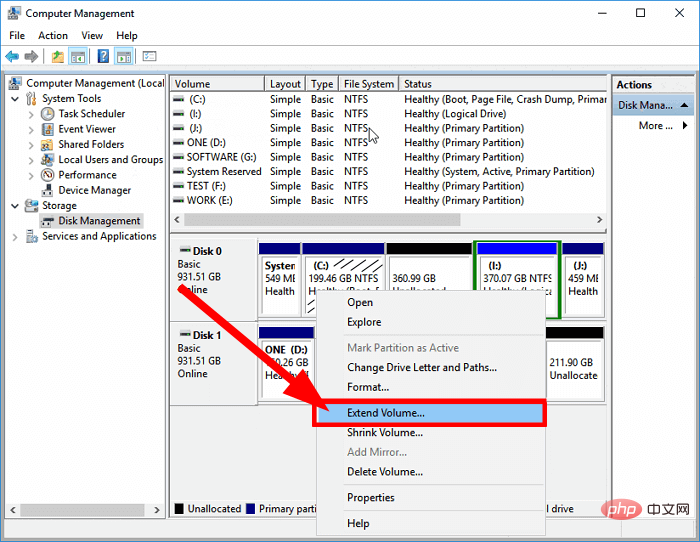centos vimrc is in the "/etc/vim" directory. You can enter the "vim /etc/vimrc" or "/etc/vimrc" command in the terminal to edit the vimrc configuration file.

The operating environment of this article: centos 7.5 system, Dell G3 computer.
Where is centos vimrc?
The vim configuration file in centOS is stored in the /etc/vim directory, and the configuration file is named vimrc:
In centOS (the current host is centos 7.5), the vim configuration file is stored in the /etc/vim directory, and the configuration file is named vimrc
In the terminal Enter the following command to edit the vimrc configuration file:
vim /etc/vimrc or /etc/vimrc
This is slightly different from ubuntu
1. Display the line number
Add a line number at the end of the file New line, enter set nu
2, syntax highlighting
Find the line "syntax on" in the file and remove the double quotes in front of it. The double quotes mean comments
3 , automatic indentation
Add a line at the end of the file, enter set autoindent
Add a line, enter set cindent
where autoindent is automatic indentation; cindent is especially for automatic indentation of C language syntax
in Add the following code at the end (to set the indentation of the Tab key and change it to the equivalent of 4 spaces):
if has( "autocmd" ) filetype plugin indent on autocmd FileType make set tabstop=8 shiftwidth=8 softtabstop=0 noexpandt ab endif set tabstop=4 set shiftwidth=4 set softtabstop=4 set expandtab
Then add the following code at the end to complete the brackets:
inoremap ( ()<esc>i
inoremap [ []<esc>i
inoremap { {}<esc>i
inoremap <esc>i</esc></esc></esc></esc>
At this point, the basic settings are complete.
Note: If VIM does not take corresponding actions after setting the above settings, please upgrade your VIM to the latest version. Generally, you only need to enter the following command in the terminal: sudo apt-get install vim
The vim configuration file in centOS (the current host is centos 7.5) is stored in the /etc/vim directory, and the configuration file name For vimrc
, enter the following command in the terminal to edit the vimrc configuration file:
vim /etc/vimrc or /etc/vimrc
This is slightly different from ubuntu
1. Display Line number
Add a new line at the end of the file, enter set nu
2, syntax highlighting
Find the line "syntax on" in the file, remove the preceding double quotes", the double quotes are Meaning of comments
3. Auto-indent
Add a line at the end of the file and enter set autoindent
Add a line and enter set cindent
where autoindent is automatic indentation; cindent is specifically for C language syntax automatic indentation
Add the following code at the end (to set the indentation of the Tab key and change it to the equivalent of 4 spaces):
if has( "autocmd" ) filetype plugin indent on autocmd FileType make set tabstop=8 shiftwidth=8 softtabstop=0 noexpandt ab endif set tabstop=4 set shiftwidth=4 set softtabstop=4 set expandtab
Then add the following code at the end to complete Full brackets:
inoremap ( ()<esc>i
inoremap [ []<esc>i
inoremap { {}<esc>i
inoremap <esc>i</esc></esc></esc></esc>
Now, the basic settings are completed.
Note: If VIM does not take corresponding actions after setting the above settings, please upgrade your VIM to the latest version. Generally, you only need to enter the following command in the terminal: sudo apt-get install vim
Recommended tutorial: "centos tutorial"
The above is the detailed content of Where is centos vimrc. For more information, please follow other related articles on the PHP Chinese website!
 centos用什么命令可查版本号Mar 03, 2022 pm 06:10 PM
centos用什么命令可查版本号Mar 03, 2022 pm 06:10 PM查版本号的命令:1、“cat /etc/issue”或“cat /etc/redhat-release”,可输出centos版本号;2、“cat /proc/version”、“uname -a”或“uname -r”,可输出内核版本号。
 centos重启网卡的方法是什么Feb 22, 2023 pm 04:00 PM
centos重启网卡的方法是什么Feb 22, 2023 pm 04:00 PMcentos重启网卡的方法:1、对于centos6的网卡重启命令是“service network restart”;2、对于centos7的网卡重启命令是“systemctl restart network”。
 centos php怎么安装opcacheJan 19, 2023 am 09:50 AM
centos php怎么安装opcacheJan 19, 2023 am 09:50 AMcentos php安装opcache的方法:1、执行“yum list php73* | grep opcache”命令;2、通过“yum install php73-php-opcache.x86_64”安装opcache;3、使用“find / -name opcache.so”查找“opcache.so”的位置并将其移动到php的扩展目录即可。
 centos 怎么离线安装 mysqlFeb 15, 2023 am 09:56 AM
centos 怎么离线安装 mysqlFeb 15, 2023 am 09:56 AMcentos离线安装mysql的方法:1、将lib中的所有依赖上传到linux中,并用yum命令进行安装;2、解压MySQL并把文件复制到想要安装的目录;3、修改my.cnf配置文件;4、复制启动脚本到资源目录并修改启动脚本;5、将mysqld服务加入到系统服务里面;6、将mysql客户端配置到环境变量中,并使配置生效即可。
 centos 7安装不出现界面怎么办Jan 03, 2023 pm 05:33 PM
centos 7安装不出现界面怎么办Jan 03, 2023 pm 05:33 PMcentos7安装不出现界面的解决办法:1、选择“Install CentOS 7”,按“e”进入启动引导界面;2、 将“inst.stage2=hd:LABEL=CentOS\x207\x20x86_64”改为“linux dd”;3、重新进入“Install CentOS 7”,按“e”将“hd:”后的字符替换成“/dev/sdd4”,然后按“Ctrl+x”执行即可。
 centos 怎么删除 phpFeb 24, 2021 am 09:15 AM
centos 怎么删除 phpFeb 24, 2021 am 09:15 AMcentos删除php的方法:1、通过“#rpm -qa|grep php”命令查看全部php软件包;2、通过“rpm -e”命令卸载相应的依赖项;3、重新使用“php -v”命令查看版本信息即可。
 如何在 CentOS 9 Stream 上安装 NagiosMay 10, 2023 pm 07:58 PM
如何在 CentOS 9 Stream 上安装 NagiosMay 10, 2023 pm 07:58 PM我们的PC中有一个磁盘驱动器专门用于所有与Windows操作系统相关的安装。该驱动器通常是C驱动器。如果您还在PC的C盘上安装了最新的Windows11操作系统,那么所有系统更新(很可能是您安装的所有软件)都会将其所有文件存储在C盘中。因此,保持此驱动器没有垃圾文件并在C驱动器中拥有足够的存储空间变得非常重要,因为该驱动器拥有的空间越多,您的Windows11操作系统运行起来就越顺畅。但是您可以在磁盘驱动器上增加多少空间以及可以删除多少文件是有限制的。在这种情况下,
 centos中ls命令不显示颜色怎么办Apr 20, 2022 pm 03:16 PM
centos中ls命令不显示颜色怎么办Apr 20, 2022 pm 03:16 PM方法:1、利用“vim ~/.bashrc”编辑用户目录(~)下的“.bashrc”文件;2、在文件内添加“alias ls="ls --color"”;3、利用“:wq!”命令保存文件内的更改;4、“exit”命令退出终端后重新连接即可。


Hot AI Tools

Undresser.AI Undress
AI-powered app for creating realistic nude photos

AI Clothes Remover
Online AI tool for removing clothes from photos.

Undress AI Tool
Undress images for free

Clothoff.io
AI clothes remover

AI Hentai Generator
Generate AI Hentai for free.

Hot Article

Hot Tools

Zend Studio 13.0.1
Powerful PHP integrated development environment

Atom editor mac version download
The most popular open source editor

ZendStudio 13.5.1 Mac
Powerful PHP integrated development environment

SublimeText3 Mac version
God-level code editing software (SublimeText3)

Dreamweaver Mac version
Visual web development tools






